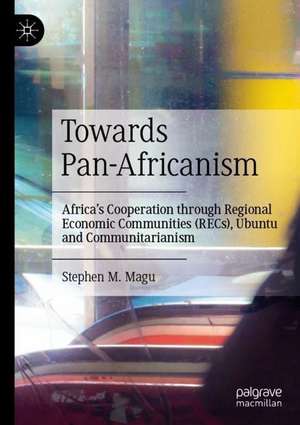Towards Pan-Africanism: Africa’s Cooperation through Regional Economic Communities (RECs), Ubuntu and Communitarianism
Autor Stephen M. Maguen Limba Engleză Hardback – 12 mar 2023
Preț: 733.03 lei
Preț vechi: 893.93 lei
-18% Nou
Puncte Express: 1100
Preț estimativ în valută:
140.27€ • 144.93$ • 116.69£
140.27€ • 144.93$ • 116.69£
Carte tipărită la comandă
Livrare economică 19 martie-02 aprilie
Preluare comenzi: 021 569.72.76
Specificații
ISBN-13: 9789811989438
ISBN-10: 9811989435
Ilustrații: XXII, 354 p. 1 illus.
Dimensiuni: 148 x 210 mm
Greutate: 0.6 kg
Ediția:1st ed. 2023
Editura: Springer Nature Singapore
Colecția Palgrave Macmillan
Locul publicării:Singapore, Singapore
ISBN-10: 9811989435
Ilustrații: XXII, 354 p. 1 illus.
Dimensiuni: 148 x 210 mm
Greutate: 0.6 kg
Ediția:1st ed. 2023
Editura: Springer Nature Singapore
Colecția Palgrave Macmillan
Locul publicării:Singapore, Singapore
Cuprins
Chapter 1: Introduction – Africa’s Regional Economic Communities (RECs).- Chapter 2: Locating Africa’s Regional Economic Communities (RECs) in IR Scholarship.- Chapter 3: New Paradigm: Communitarian, Humanist African Theory of Regional Integration.- Chapter 4: East African Community II: Second Time the Charm?.- Chapter 5: Intergovernmental Authority on Development (IGAD).- Chapter 6: Southern African Development Community (SADC).- Chapter 7: Common Market for Eastern and Southern Africa – COMESA.- Chapter 8: Economic Community of West African States (ECOWAS).- Chapter 9: Community of Sahel–Saharan States (CEN-SAD): All Our Northern Brethren.- Chapter 10: Economic Community of Central African States (ECCAS): Tropical Heat, Troubled Middle.- Chapter 11: Arab Maghreb Union (AMU): (In or Mostly) Out of Africa and Tumultuous Inertia.- Chapter 12: Africa’s RECS – Promise and Peril, Pandemic Slips and Possible Futures.
Notă biografică
Stephen M. Magu is Assistant Professor of Political Science at Norfolk State University, USA. Stephen holds a PhD in International Studies (2013, ODU), a Master of Social Work degree (2007, WashU) degree from Washington University in St. Louis and a Bachelor of Education (Arts) degree from Kenyatta University (1999, KU).
Textul de pe ultima copertă
This book traces the development and impact of regional economic communities (RECs) in Africa and addresses a timely question: do REC members, and the REC itself, positively influence member states’ behaviors towards other members and more broadly, regionally and continentally due to REC membership? ‘Changing member states’ behaviors’ is measured across three ‘interconnected, fundamental dimensions of societal-systems’ proposed by Marshall and Elzinga Marshall in CSP’s Global Repot 2017. These are i) the persistence of conflict or its counterpoint, achieving peace, ii) fostering democratization and better governance, and iii) achieving socio-economic development and (as proposed by this research, a fourth dimension), iv) being active participants in multilateralism? Is membership in a REC ultimately beneficial to the member and other countries in the region? While there are no clear and obvious – at least, discernible traditional – benefits such as increasein trade (perhaps because Africa’s overall trade relative to the world is about 3 percent), there are other non trade benefits (e.g., decrease in conflict, coercion to take certain actions towards peace and refrain from others, coups and wars) presenting in REC member states. These in/actions, abilities, coercions, exclusions and cooperation instances are outlined and discussed in the book.
Stephen M. Magu is Assistant Professor of Political Science at Norfolk State University, USA. Stephen holds a PhD in International Studies (2013, ODU), a Master of Social Work degree (2007, WashU) degree from Washington University in St. Louis and a Bachelor of Education (Arts) degree from Kenyatta University (1999, KU).
Caracteristici
Offers a historical overview of regional economic communities (RECs) in Africa Evaluates whether REC membership has any tangible benefits for the members Introduces Ubuntu as a conceptual explanation of why African nations cooperate
